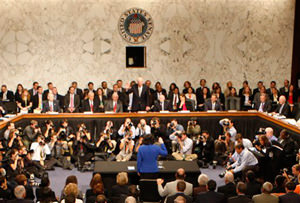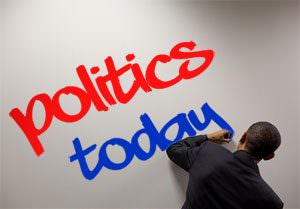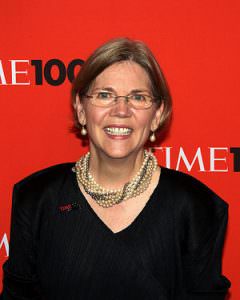Sotomayor’s Bumpy Road to Confirmation
In Washington, a Supreme Court nomination usually sets off a flood of political accusations, and in this case the GOP certainly upheld the grand old tradition of seeing sin where none existed.The GOP had to turn to some pretty flimsy accusations in the fight over Sonia Sotomayor's confirmation.
The Senate has made it official: Sonia Sotomayor will wear the robe of a U.S. Supreme Court justice.
Federal appellate Judge Sotomayor’s nomination was confirmed Thursday on a vote of 68 to 31. For the 55-year-old Greenwich Village resident, who is of Puerto Rican descent, the action marked the end of an 11-week-long vetting process in which, at least in some minds, troubling questions of ethnic identity, gender and judicial activism were raised.
The nomination easily survived a barrage of criticism that started when President Barack Obama announced his selection of Sotomayor on May 26 to replace retiring Associate Justice David Souter, 69. Souter often voted with the liberal bloc on the high court although he was nominated by a conservative Republican president, George H.W. Bush, in 1990. In recent years, the typical vote split in cases with heavy ideological or political content has been 5 to 4, with the conservatives on top.
The dyed-in-the-wool conservatives on the court are Chief Justice John Roberts and Justices Antonin Scalia, Clarence Thomas and Samuel Alito. The liberal votes usually come from Justices Souter, John Paul Stevens, Ruth Bader Ginsburg and Stephen Breyer. The conservative Justice Anthony Kennedy is often the crucial swing vote.
According to a 2008 article “ranking the politics” of U.S. justices over the years, “Four of the five most conservative justices to serve on the Supreme Court since Franklin Roosevelt … are currently sitting on the bench today.” A fifth member of the current court, Kennedy, nominated by the Republican Ronald Reagan in 1988, also is in the top 10. The survey covered the 43 judges who have been on the high court since 1937.
Here are the rankings of the conservatives now on the court, with the percentage of conservative votes of each: No. 1, Thomas, 82.2 percent; No. 3, Scalia, 75.7; No. 4, Roberts, 75.3; No. 5, Alito, 74; No. 10, Kennedy, 64.7 (the No. 2 spot was held by the late Chief Justice William Rehnquist, at 81.5 percent).
Another article, also posted last year, gives the rankings of the four other court members, all liberals, along with their percentages of conservative votes: No. 29, Souter, 37.4 percent; No. 31, Breyer, 37.2; No. 32, Stevens, 34.1; and No. 35, Ginsburg, 31.2.
Although it’s impossible to foresee a justice’s ideological evolution over a career of many years on the bench (witness the far right’s disappointment in Souter), Sotomayor is expected to generally be in the liberal bloc. And because she will replace the liberal Souter, the ideological composition of the court will not change. The vote division will continue to favor the justices on the right — unless the retirement or death of a conservative justice enables President Obama to send up another liberal nominee. None of the conservative justices is so old that infirmities of age would be probable to force his retirement during a two-term Obama presidency. If Obama were president for eight years and the five conservative justices remained on the court, these would be their ages when he left office: Scalia, 80; Kennedy, 80; Thomas, 68; Alito, 66; and Roberts, 61. So, it’s far from a sure bet that Obama will be able to replace any conservatives with liberals.
For sake of comparing Thursday’s 68-31 vote to a couple of other Senate confirmation votes within the last several years: The 2005 vote on Roberts was 78 to 22; the 2006 vote on Alito, 58 to 42.
Berating a president’s Supreme Court nominee has been one of the delightful perks of public service for generations of Washington pols, both Republicans and Democrats. Many Supreme Court nominees have been rewarded for their achievements by being thrashed in the village square. Even a saintly, judicially flawless jurist who had walked on the water of the nearby Capitol Reflecting Pool en route to a confirmation hearing might not avoid a generous lashing at the hands of Senate inquisitors from the opposing party. By Washington standards, it’s all in good fun.
A nominee’s paper trail almost always presents something for the opposition to sink its fangs into. In Sotomayor’s case, the succulent item was a statement she made in a 2001 speech at UC Berkeley: “ … I would hope that a wise Latina woman with the richness of her experiences would more often than not reach a better conclusion than a white male who hasn’t lived that life.” (Click here to see the text of her speech.)
Had Sotomayor — who made similar remarks with slightly different phrasing on other public occasions — known that within the decade she would be facing a congressional hearing on her nomination to the Supreme Court, she may well have chosen different words. In testifying July 14 she said about the controversial comment:
“I was trying to inspire them [members of Latino groups she was addressing] to believe that their life experiences would enrich the legal system, because different life experiences and backgrounds always do. I don’t think there is a quarrel with that in our society. I was also trying to inspire them to believe they could become anything they wanted to become, just as I had.”
She went on to say to the senators: “The context of the words that I spoke have created a misunderstanding.”
At a hearing session the next day, she admitted in response to a question from a GOP senator that her “wise Latina” phrase was “a rhetorical flourish that fell flat.”
But even in view of her admission — some might say her apology — the quotation carried what many in America’s minority communities and elsewhere saw as a wealth of insight, especially when read in the context of the full speech she gave at Berkeley. Of course, such insight was lost on many of the judge’s congressional critics: She was denounced as a self-indulgent judicial activist who would make court decisions on the basis of “empathy” rather than the law and as someone who saw herself as imbued with special powers because of her ethnicity and life experience. The emptiness of the Republican argument was targeted by Marie Cocco, a syndicated columnist featured on Truthdig, who said of GOP Sen. Jeff Sessions: “The senator pre-emptively declared that he would not vote for a judge who uses the ‘empathy standard’ in deciding cases—a reference to the sensitivity toward average people that President Obama said he looked for in nominees, and which has been transformed by the political right into code for favoring blacks or other ethnic minorities over whites. Sessions seemed to predict nothing short of the collapse of American law as we know it if Sotomayor is confirmed. …” Sessions later would be one of the 31 “nays” in the Senate vote confirming the Sotomayor nomination.
Another of Truthdig’s syndicated columnists, Eugene Robinson, wrote: “Republicans’ outrage, both real and feigned, at Sotomayor’s musings about how her identity as a ‘wise Latina’ might affect her judicial decisions is based on a flawed assumption: that whiteness and maleness are not themselves facets of a distinct identity. Being white and male is seen instead as a neutral condition, the natural order of things. Any ‘identity’—black, brown, female, gay, whatever—has to be judged against this supposedly ‘objective’ standard.”
The egomaniacal thinking of some right-wing congressmen who assailed Sotomayor might go something like this: I’m white, I’m male, I’ve got money. My reality is the only true one, because it’s divinely decreed. God votes for my life experience. Case closed.
Years before he nominated Sotomayor, Barack Obama himself had something important to say about the approach of judges. A July article in Truthdig quotes then-Sen. Obama as saying in 2005 about the Supreme Court: ” … 5 percent of cases … are truly difficult. In those cases, adherence to precedent and rules of construction and interpretation will only get you through the 25th mile of the marathon. That last mile can only be determined on the basis of one’s deepest values, one’s core concerns, one’s broader perspectives on how the world works, and the depth and breadth of one’s empathy.”
Obama’s remarks align with Sotomayor’s 2001 Berkeley address. Near the end of her speech, the judge said: “[T]o understand takes time and effort, something that not all people are willing to give. For others, their experiences limit their ability to understand the experiences of others. Others simply do not care. Hence, one must accept the proposition that a difference … [will result from] the presence of women and people of color on the bench. Personal experiences affect the facts that judges choose to see. My hope is that I will take the good from my experiences and extrapolate them further into areas with which I am unfamiliar. I simply do not know exactly what that difference will be in my judging. But I accept there will be some based on my gender and my Latina heritage.”
The gross prejudice — an “anti-white” and “anti-male” prejudice — alleged by many of the judge’s opponents is hard to see in the context of the full speech.
Fortunately for the nation, the arguments against the nominee did not carry the day. Sotomayor is expected to be sworn in quickly as an associate justice of the Supreme Court. She has promised to make decisions on the basis of the laws of the land. I believe she will do so. And surely her life experience will influence those decisions—just as life experience has contributed to the rulings of every other judge, male or female, Latino or of any other ancestry, who had a life before ascending to the bench.
In light of Sotomayor’s confirmation and other recent news, doors appear to be opening wider in America. In the same week that the judge was testifying before the senators, Judy Chu of Southern California became the first Chinese-American woman elected to Congress.
The “woman’s experience” may be finding deeper root in public life. Maybe one day “thinking like a woman” — if that phrase means empathy, compassion, aversion to violence and being open to talking things out — will no longer be a sin for public officials.
As syndicated columnist Ellen Goodman wrote in Truthdig: “Wasn’t it OK—even important—for women to bring a different perspective to the table when talking about science, violence, business? Couldn’t they bring a different perspective to the bench when listening to Lilly Ledbetter plead for equal pay, or to a 13-year-old who was strip-searched? … [W]hen women are asked to ‘rise above’ their experience, to ignore the difference in background, they are often being told to expunge the female and to think/work/live/rule like a man. Score one for the status quo.”
Here’s a perverse little fantasy that might bring a smile to those folks who demand that judges park their life experience at the curb outside the courtroom: Suppose there was a way to brainwash people so that experience did not influence judgment, and this mental scrubbing was universally inflicted on judges and other agents of government. An instant cure for the judicial activism of those damned left-wing judges, eh?
Maybe. But life would quickly curdle under the administration of “neutral” robots. Soon, there would be few smiles on the right-hand fringe or any other part of the political spectrum. It wouldn’t take long for the unhappy results of soulless governance to devastate the American polity. The heart and humanity of executive, legislative and judicial functions would disappear, and the nation would suffer deeply for it.
For now, there are no such automatons, however much extremists might call for them, and flesh-and-blood people hold seats of governmental and judicial authority. For now, the nation will have a wise Latina on the Supreme Court — only the third woman to sit there and the first justice of inarguable Hispanic extraction. May Sonia Sotomayor serve well. May she serve the interests of all Americans in making fair and just decisions under the laws of the United States.
T.L. Caswell worked for the Los Angeles Times for many years and now edits for Truthdig.
Your support matters…Independent journalism is under threat and overshadowed by heavily funded mainstream media.
You can help level the playing field. Become a member.
Your tax-deductible contribution keeps us digging beneath the headlines to give you thought-provoking, investigative reporting and analysis that unearths what's really happening- without compromise.
Give today to support our courageous, independent journalists.





You need to be a supporter to comment.
There are currently no responses to this article.
Be the first to respond.